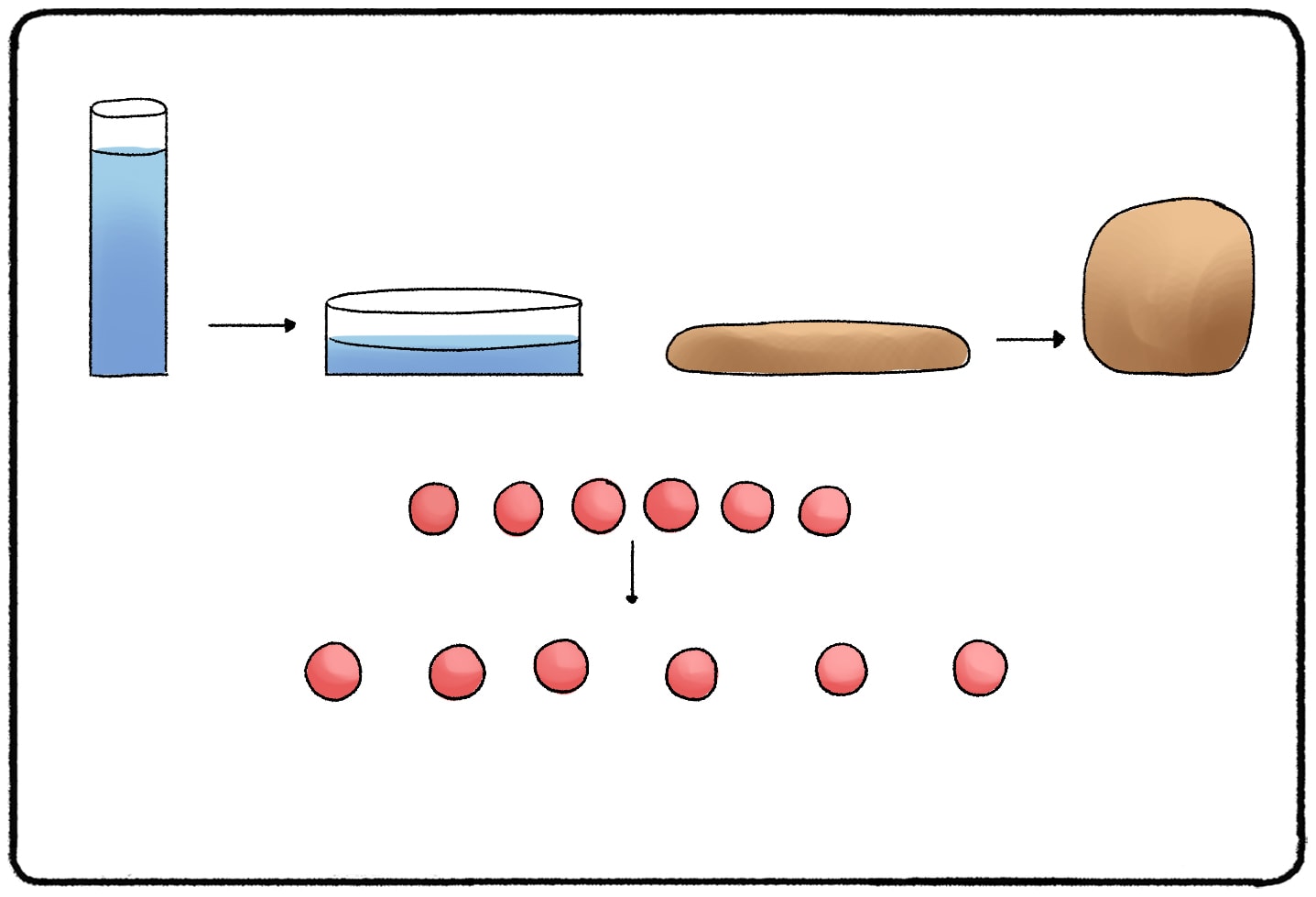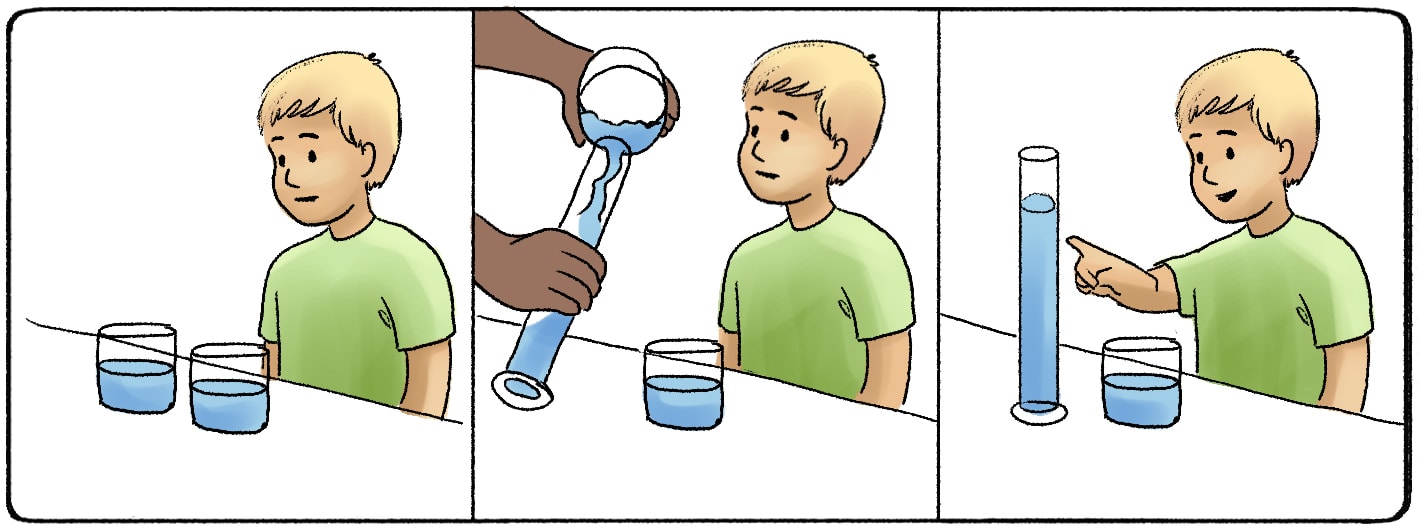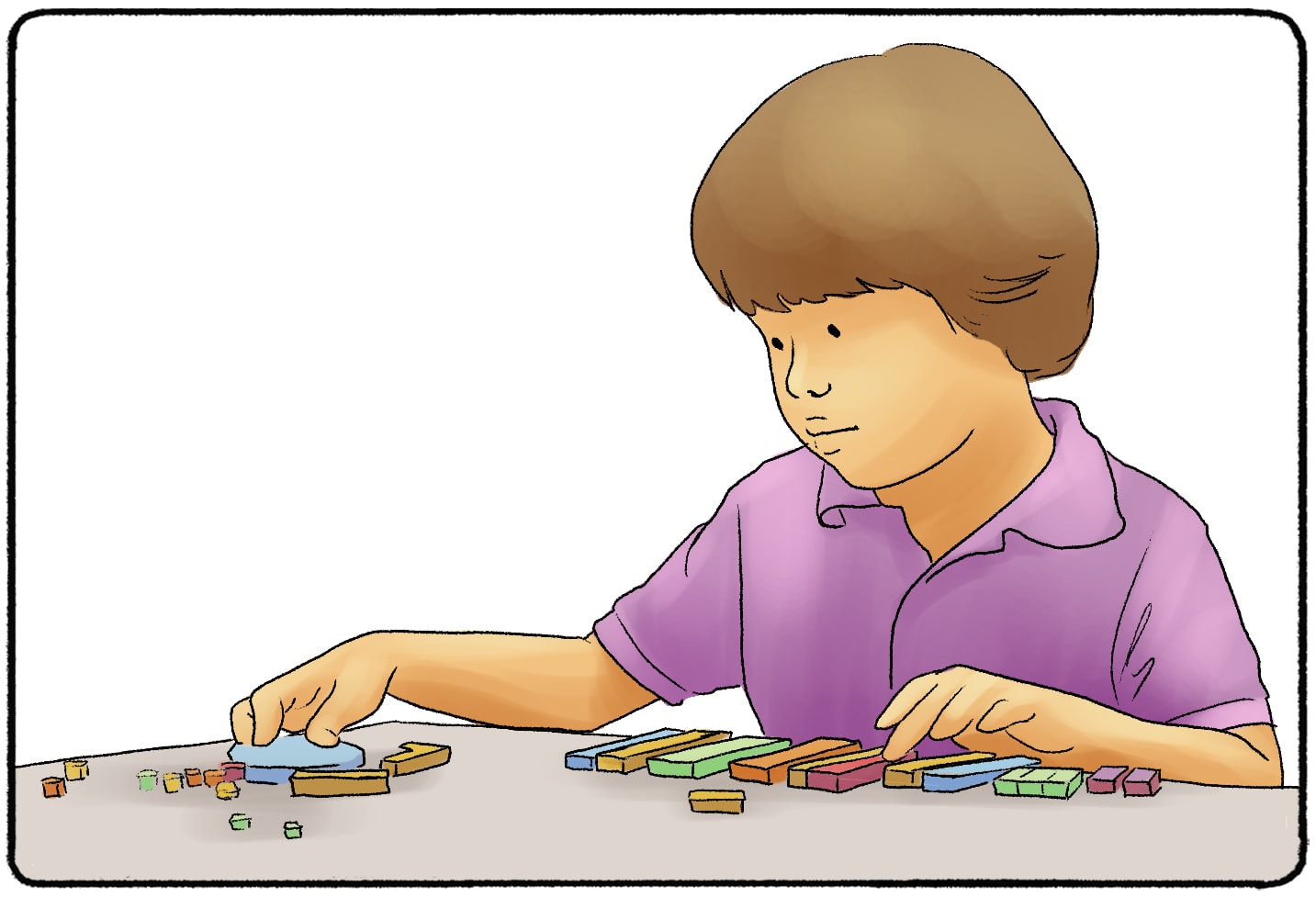Cognitive development is when children develop problem-solving abilities, thinking logically, and making decisions. As they grow and develop, they understand more about the world around them and how it works - and they enter the Concrete Operational Stage.
What is the Concrete Operational Stage?
By age 6 or 7, the child has entered the Concrete Operational Stage. This is the third stage in Jean Piaget’s Theory of Cognitive Development. During this stage, the child is beginning to grasp logical reasoning. The most important developments in this stage include that of Conservation, Classific
Concrete Operational Stage Age
The concrete operational stage starts around age 6 or 7 and ends at 11 or 12. For many students, this is when they enter their first “formal” years of grade school. A good way to remember this timeframe is to think that elementary schools could be made of concrete.
The CDC refers to the years between the ages of 6 and 11 as “middle childhood.”
Preparing For the Concrete Operational Stage
The concrete operational stage of cognitive development builds upon the foundational abilities acquired during the earlier stages, particularly the preoperational stage.
Recap of the Preoperational Stage:
Before delving into the concrete operational stage, let's briefly revisit the preoperational stage, which typically spans ages 2 to 6. During this period, children experience rapid cognitive and linguistic growth. They start using language more fluently and engage in symbolic play, which allows them to represent the world around them through imaginative scenarios. However, their thinking during this stage is still largely egocentric, meaning they find it challenging to see things from another person's perspective. This stage is also marked by a limited understanding of concepts like conservation – for example, not recognizing that two differently-shaped containers can hold the same amount of liquid.
Transitioning to the Concrete Operational Stage:
As children move from the preoperational to the concrete operational stage, their cognitive abilities undergo significant refinement. Here's what a child exiting the preoperational stage typically can do:
- Construct sentences that are 4-5 words long.
- Use pronouns appropriately and apply correct verb tenses.
- Understand and execute multiple commands in sequence.
- Grasp the concept of conservation, recognizing equivalencies in different contexts.
- Identify common symbols, like understanding that stop signs or traffic lights have specific meanings in their environment.
Building on these foundational skills, children in the concrete operational stage begin to shed some of the limitations of the preoperational stage. They start moving away from an egocentric worldview, allowing for more empathetic interactions. This paves the way for deeper social connections. For instance, a playmate at age 5 might just be a companion for games, but by age 11, this playmate can become a confidant and a lifelong friend.
Furthermore, their cognitive processing becomes more nuanced. Though abstract thinking is still emerging, they can think more logically about concrete events. This stage fascinates parents as they witness their child's burgeoning ability to reason, problem-solve, and let their imaginations soar.
What Skills Does a Child Gain and Build During the Concrete Operational Stage?
- Conservation
- Decentration
- Classification
- Reversibility
These four processes may begin in the earlier stages of development but really accelerate during the concrete operational stage. It is important to know that classification requires many skills in itself! Moving past animism, seriation, and transitivity are all part of the classification process.
Conservation
One of the defining elements of the Preoperational Stage is that children have difficulty understanding Conservation. Not ecological conservation. Children between the ages of 2-7 have difficulty understanding that a quantity is the same despite a physical appearance or container change.

Example of Conservation in the Concrete Operational Stage
A child in the Preoperational Stage will not be able to see that 10mL of liquid in a short, wide glass is the same as 10mL of liquid in a tall, skinny glass. As the child enters the Concrete Operational Stage, they begin to grasp this concept. They can use other “clues” about an object to assess its quantity. Sure, the ball of clay has been smashed flat. But it’s still the same amount of clay. Yes, the green tennis ball is now blue. But it will still bounce the way a normal tennis ball would.
Decentering
Why do children start to grasp the concept of conservation at this point in their development? Piaget claims that it’s due to a process called decentering or decentration. This process allows the child to see many aspects of one problem.
Example of Decentering in The Concrete Operational Stage

They can see that one glass is taller than the other, but also that one is wider and that both glasses read 10mL. Children in earlier stages can only focus on one of these elements, and that one element solely influences their thinking or their answer.
Classification
Decentration also plays a role in classification. Classification is the ability to organize and classify items and ideas by similar characteristics.
Example of Classification in the Concrete Operational Stage
Children can observe an item that looks and feels like a plant and classify it as a plant. But they can also see how a green plant fits in with other green items. They can separate green and red plants but still see them as “plants.” They can see how plants differ from animals and how animals differ from other household items.
Animism
At the Concrete Operational Stage, the child has moved past animism. Animism is the idea that all things and all creatures have a soul. Once the child reaches the Concrete Operational Stage, they can begin to separate and classify objects that are animate vs. inanimate.
Seriation
Children at the Concrete Operational Stage also have the ability to organize the items that they have classified. Seriation is the process of arranging items in a logical order. Not only can the child organize all of the red flowers, but they can also arrange the red flowers by how dark the flower is or how long their stems are.
Transitivity
As the child develops these skills, they can also use transitive inference. This allows them to compare the color of two different red flowers by introducing a third red flower to the collection. If they see that one flower is darker than a second flower and the second flower is darker than a third flower, they can also infer that the first flower is darker than the third one.
Reversibility
Reversibility is another major development in the Concrete Operational Stage. It simply means that children realize that actions can be reversed. This allows them to think backward to solve a problem. Sure, they know that 2 + 2 = 4. With reversibility, they can use that information to figure out that 4-2=2.
This understanding also helps the child to understand Conservation at a deeper level. Yes, the ball of clay has been flattened. As the child develops the idea of reversibility, they begin to see that they can mold the flattened clay back into a ball, all while keeping the same quantity of clay.

Other Skills Developed During the Concrete Operational Stage
Although the skills observed by Piaget are important in the child’s cognitive development, parents and teachers may be focused on teaching their children to read and write around this time. A child may reach many educational milestones and develop various skills during the ages of 6-12:
- Telling jokes
- Writing out numbers
- Counting allowance money
- Doing their morning routine (brushing teeth, picking out clothes, etc.) by themselves
- Sharing stories about their day at school
- Playing catch, tag, or other games
- Understanding time
- Adhering to a chore chart
- Building friendships
The average 8-year-old child learns up to 20 words per day! This is certainly an exciting time for any parent or teacher watching a child start to understand their world more.
Impact of the Concrete Operational Stage on Daily Life, Learning, and Interactions
The transition from the preoperational to the concrete operational stage signifies cognitive changes and deeply influences a child's daily life, learning experiences, and interpersonal interactions.
1. Daily Life: As children start to think more logically and grasp the concept of conservation, they become more aware of their surroundings and the permanence of objects. For instance, they begin to understand that even if they can't see their toy under the bed, it's still there. This concrete thinking enables them to solve problems in their daily routines, such as searching for a misplaced item or planning ahead for a school project.
2. Learning Abilities: The classroom experience changes significantly for children in the concrete operational stage. Their enhanced logical reasoning and categorization skills allow them to grasp mathematical concepts like basic arithmetic operations and understand scientific principles, such as the water cycle, more profoundly. They can now sequence historical events, classify objects based on multiple criteria, and start understanding more abstract concepts in subjects like mathematics. This is the age where foundational concepts in math and science, which require logical thinking and categorization, are solidified.
3. Social Interactions: Regarding interpersonal interactions, diminishing egocentrism means children become more considerate and understanding of others' viewpoints. This paves the way for deeper friendships and better conflict resolution. Children now have a greater capacity for empathy and understanding of the feelings and perspectives of their peers. This can lead to more meaningful friendships and a better ability to work in teams or groups. They can also understand rules and their importance in games or societal contexts, leading to a more structured and rule-following behavior.
Moreover, with the onset of decentration, children become more skilled in understanding complex social situations. They can now comprehend that a person can have multiple roles (e.g., a woman can be a mother, a daughter, and a teacher simultaneously) and navigate their relationships with such individuals accordingly.
The concrete operational stage is crucial in a child's cognitive development. The skills acquired during this stage lay the foundation for more abstract thinking in the subsequent formal operational stage. By recognizing and understanding these developmental milestones, parents and educators can provide more targeted support and resources to help children thrive during this phase.
How to Support a Child in the Concrete Operational Stage
Parents can do much more with their kids as they grow and enter the concrete operational stage. They can also communicate to the child why they are engaging in these activities and how they can use these skills at school or play with friends.
Ask them about bullies and friends at school. Children will form many positive relationships during this time. Negative relationships, unfortunately, will also form. Bullying is not unique to the concrete operational stage - bullies can be aggressive toward other children as early as age 3. But bullying can be attributed to the child's egocentrism during this time. Children should be developing empathy during this age. Fortunately, children can also express their feelings better than at earlier stages. Give your child the space to tell you about bullies or how other kids at school might make them feel.
Set up a routine. As children explore their autonomy, suggest a routine to give them more power and control over their day. Once their chores are done, they can be rewarded. Getting into the habit of having a routine early will teach children how to organize all the tasks they can do and make the most of their time.
Set ground rules. Similarly, you can set limits for your child as they take on different interests. Children will seek out screen time and phones around this age. Communicate with them that you need to limit this time and why. The earlier these ground rules are implemented, the more normal they will be for the child.
Write stories with your child. Moving past egocentrism allows a child in this stage to put themselves in the shoes of others. Share a conflict a character in a story might have, then ask your child what they would do. How do they think Little Red Riding Hood feels when she sees her grandma is a wolf? How do they think the Beast feels when they have transformed from a Prince to the Beast and back again?
Let them help you bake. Many skills developed during the concrete operational stage can be applied while baking a cake or cookies. Show them that one cup of flour in the measuring cup is still the same amount when poured into the bowl. Point out that all of these ingredients can be made into one cake and that a cake comprises all these ingredients. Ask them who might like to eat cookies: Mom after a long work day? Grandma, who has been feeling sick? Kids might make a mess during this time, but they will build on many cognitive skills while doing it!
What Comes After the Concrete Operational Stage?
Many exciting developments take place in the Concrete Operational Stage, but there is still one step to go in Piaget’s Theory of Cognitive Development. During the Concrete Operational Stage, children can only apply logic to things they have seen or currently exist. In the Formal Operational Stage, they can take things one step further and apply logic to things that pretend or will exist in the future.
While children gain the ability to conduct inductive reasoning, they still struggle with deductive reasoning.
Learn more about the child’s final stage of cognitive development here!
